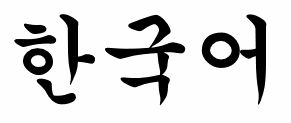Korean Learner Language
A Korean language learner must be able to use Korean in unrehearsed communication. Being able to judge the accuracy of Korean sentences, or memorize, recite and understand a small set of Korean sentences does not prepare a learner for spontaneous communication (for supporting research, see H. Lee, 2004).
A learner who really knows the language can exchange information using Korean in unrehearsed communication, with a degree of accuracy, complexity and fluency that increases over time.
Korean language teachers can understand the development of Korean learner language in their own classrooms using basic techniques from second-language acquisition research. The following six units feature video-clips of Korean learner language produced by two second-year learners in unrehearsed communication activities. Each unit shows you how to analyze Korean learner language from a different perspective, and consider ways you can support its development:
- Learners - Individual difference
- Error Analysis
- Interlanguage
- Interaction
- Reference
- Complexity
We include a full set of transcribed videos of both learners, and an annotated bibliography of published research on Korean learner language, if you want to go deeper in your background reading.
